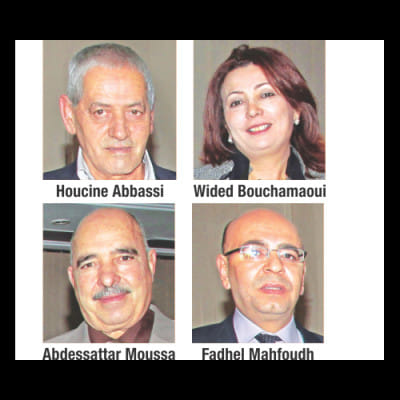Nobel Peace Prize goes to Tunisia mediators

Tunisian civil society groups won the Nobel Peace Prize yesterday for helping to create the only democracy to emerge from the Arab Spring, at a time when the country is under threat from jihadist violence.
The Nobel panel said the award to the National Dialogue Quartet was intended as an "encouragement to the Tunisian people" and as an inspiration for others, particularly in the turbulent Middle East.
The award drew praise from around the world as a "beacon of hope" for the region, while one winner said it was a tribute to the "martyrs" who died in the struggle to move the north African country from dictatorship to democracy.
The committee hailed the quartet's "decisive contribution to the building of a pluralistic democracy in Tunisia in the wake of the Jasmine Revolution of 2011," chairwoman Kaci Kullmann Five said.
"The Norwegian Nobel Committee hopes that this year's prize will contribute towards safeguarding democracy in Tunisia and be an inspiration to all those who seek to promote peace and democracy in the Middle East, North Africa and the rest of the world," the panel said.
During the wave of unrest which erupted in January 2011 after the death of a young jobless university graduate who had set himself on fire in protest over police harassment and unemployment, more than 300 people were killed.
Tunisia's powerful General Labour Union, one of the quartet members, described it as a "tribute to martyrs of a democratic Tunisia."
"This effort by our youth has allowed the country to turn the page on dictatorship," said union head Houcine Abassi.
Democracy remains fragile in Tunisia, however, which has been rocked by bloody attacks by Islamic State group jihadists this year and some high-profile political killings.
"The prize is a tribute and a call to support all civil society forces engaged in the fight for democracy, pluralism and rule of law," added Unesco chief Irina Bokova.
The Quartet was formed in 2013 when the process of democratisation was in danger of collapsing because of widespread social unrest, "establishing an alternative, peaceful political process" at a time when Tunisia was on the brink of civil war, Kullmann Five said.
It is made up of the Tunisian General Labour Union, the Tunisian Confederation of Industry, Trade and Handicrafts, the Tunisian Human Rights League, and the Tunisian Order of Lawyers.
"The Quartet exercised its role as a mediator and driving force to advance peaceful democratic development in Tunisia with great moral authority," the Nobel panel said.
"More than anything, the prize is intended as an encouragement to the Tunisian people, who despite major challenges have laid the groundwork for a national fraternity which the Committee hopes will serve as an example to be followed by other countries."
Since the Tunisia uprising that began in December 2010, the Arab world has been rocked by massive upheaval has toppled leaders in Egypt, Libya and Yemen and plunged Syria into a brutal civil war.
Tunisia has won praise for its transition which has involved the adoption of a constitution in January 2014 and the holding of its first democratic elections at the end of the year.
But this year it was hit by a massacre at a Tunis museum in March that killed 22 people, mostly tourists, and a mass killing at a beach resort last month that left 38 foreigners dead. Both were claimed by the Islamic State group.
It is the second time a Nobel peace honour has been bestowed in connection with the Arab Spring after Tawakkol Karman, an activist fighting Yemen's regime, shared the 2011 prize with Liberian President Ellen Johnson Sirleaf and Liberian "peace warrior" Leymah Gbowee for their struggle for women's rights and empowerment.
The prize is a gold medal, a diploma and a cheque for eight million Swedish kronor (around 860,000 euros/$950,000) to be shared by the laureates.
They will receive their prizes at a ceremony in Oslo on December 10, the anniversary of the 1896 death of prize creator Alfred Nobel, a Swedish philanthropist and scientist.
Last year, Pakistan's Malala Yousafzai, who was 17 at the time, became the youngest-ever winner of the Nobel Peace Prize in an award shared with India's Kailash Satyarthi for their struggle against the suppression of children and their right to education.

 For all latest news, follow The Daily Star's Google News channel.
For all latest news, follow The Daily Star's Google News channel. 



Comments